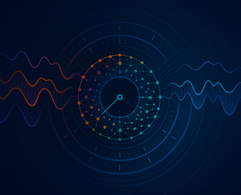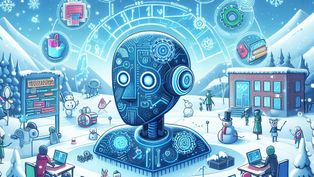Kurse werden geladen...
Aktuelle Kurse
Extreme weather events have caused severe damage and loss of life in recent decades. Traditional numerical weather prediction, while accurate, is computationally intensive—requiring supercomputers that consume massive amounts of energy. In contrast, energy-efficient AI offers a transformative alternative. This course explores how modern AI models can drastically reduce energy consumption and CO₂ emissions while improving the accuracy and accessibility of weather forecasting. Through practical examples, we demonstrate how techniques like LoRA fine-tuning, diffusion models, and GNSS-based sensing can enhance forecasting capabilities on both large and personal devices. By the end of this course, learners will understand how efficient AI methods enable sustainable, high-precision weather prediction for the future.
- 3. Dez. 2025 - 17. Dez. 2025
- Big Data and AI
- Leistungsnachweis
- en
- de, en
Kurse im Selbststudium
In this course, you’ll learn how to work with time series data — one of the most common and challenging types of data across industries. We’ll start from the basics, introducing you to key concepts like trends, seasonality, and stationarity, and gradually move into more advanced forecasting techniques. You’ll explore both classical statistical models and modern machine learning approaches, and see how deep learning architectures like RNNs, LSTMs, and transformers are being used for cutting-edge forecasting tasks today. Along the way, we’ll cover real-world examples from finance, healthcare, weather forecasting, and beyond. By the end of the course, you’ll have the skills to analyze time series data, build reliable forecasting models, and apply them to practical problems.
- Seit 1. Okt. 2025 im Selbststudium
- Big Data and AI, Data Science
- Leistungsnachweis
- en
- de, en
Practical Computer Vision in PyTorch is a comprehensive, hands-on course for developers and practitioners eager to explore computer vision with PyTorch. It spans image classification, object detection, segmentation, and generative modeling. Emphasizing implementation, participants work through coding demos and projects with industry-standard tools and libraries. By the end, they will be able to build and fine-tune computer-vision models for real-world applications.
- Seit 21. Mai. 2025 im Selbststudium
- Big Data and AI, Data Science
- Leistungsnachweis
- en
- de, en
Artificial Intelligence (AI) offers transformative potential across industries, but its development and deployment come with environmental costs. The course covers topics such as the carbon footprint of AI models, methods for measuring and reporting environmental impacts, and challenges in estimating the sustainability of AI technologies. Students will gain insights into energy and carbon accounting, along with case studies demonstrating how AI’s environmental footprint is assessed. The course aims to provide a comprehensive understanding of the relationship between AI and the environment, equipping learners with knowledge to contribute to more sustainable AI practices.
This course is part of the Sustainability in the Digital Age series, a collaborative project between colleagues from Stanford University, SAP and the Hasso Plattner Institute.
- Seit 18. Mär. 2025 im Selbststudium
- Big Data and AI
- Leistungsnachweis
- en
- de, en
Künstliche Intelligenz durchdringt zunehmend unseren (Arbeits)Alltag. Vor allem generative KI-Systeme haben die Masse der Arbeitnehmerschaft erreicht. Doch diese KI-Systeme sind nicht frei von Vorurteilen und Verzerrungen – sogenannten Biases – denn sie sind durch Menschen erzeugt. Diese Biases können zu diskriminierenden Ergebnissen führen. Das Erkennen, Verstehen und Bereinigen von Biases ist deshalb von entscheidender Bedeutung, um eine gerechte und ethische Nutzung zu gewährleisten und potenzielle Schäden von Teilnehmenden und Unternehmen abzuwählen.
- Seit 26. Feb. 2025 im Selbststudium
- Big Data and AI
- Leistungsnachweis
- de
- de, en
This course explores the hype and realities surrounding AI, the challenges companies face in using AI profitably, and how Germany is performing in the AI landscape. It offers insights into how AI can power business strategies, be successfully integrated into operations, and scaled for long-term profitable growth. Created for managers and data experts looking to maximize AI’s potential, the course requires no prior experience, though a basic understanding of business strategy, data analytics, and AI concepts is beneficial.
- Seit 23. Dez. 2024 im Selbststudium
- Big Data and AI
- Leistungsnachweis
- en
- de, en
Die rasante Entwicklung von generativen KI-Systemen wie ChatGPT, DALLE und Midjourney hat künstliche Intelligenz und maschinelles Lernen in den öffentlichen Fokus gerückt.
Tauchen Sie mit der openHPI Winter School in die faszinierende Welt der künstlichen Intelligenz und des maschinellen Lernens ein! Wir präsentieren Ihnen die erfolgreichsten openHPI KI-Kurse. Unsere Kurse bieten Ihnen in diesem Winter die ideale Möglichkeit, unabhängig von Ihrem bisherigen Wissensstand und Erfahrungsniveau, Ihr Verständnis für KI und ML zu vertiefen.
Sie können jeden der vier beliebten KI-Kurse im Selbststudium abzuschließen und erhalten dafür einen Leistungsnachweis. Melden Sie sich jetzt kostenlos an und starten Sie Ihre spannende Reise in die Welt der Künstlichen Intelligenz!
- Seit 31. Mär. 2024 im Selbststudium
- Big Data and AI
- Leistungsnachweis
- de
Gain a basic understanding of how numerical representations transform language! Explore the world of text embeddings in this online course, covering essential topics such as tokenization, historical models, modern techniques, and practical applications.
It's free of charge and no prior AI experience is necessary.
- Seit 24. Dez. 2023 im Selbststudium
- Big Data and AI, Data Science
- Teilnahmebestätigung
- en
- en
Despite the fact that it affects our lives on a daily basis, most of us are unfamiliar with the concept of a knowledge graph. When we ask Alexa about tomorrow's weather or use Google to look up the latest news on climate change, knowledge graphs serve as the foundation of today's cutting-edge information systems. In addition, knowledge graphs have the potential to elucidate, assess, and substantiate information produced by Deep Learning models, such as Chat-GPT and other large language models. Knowledge graphs have a wide range of applications, including improving search results, answering questions, providing recommendations, and developing explainable AI systems. In essence, the purpose of this course is to provide a comprehensive overview of knowledge graphs, their underlying technologies, and their significance in today's digital world.
- Seit 21. Nov. 2023 im Selbststudium
- Big Data and AI
- Leistungsnachweis
- en
- en
On 11th July, 2023, the first KISZ workshop on "Pre-trained AI Models: The speech-to-summary example" takes place. The contents of the workshop will be prepared in this Background Talk format, which is open to all interested parties.
- Seit 30. Sep. 2023 im Selbststudium
- Big Data and AI
- en
Die rasante Entwicklung generativer KI-Systeme wie ChatGPT, DALLE und Midjourney revolutioniert unsere Welt und stellt uns vor neue, faszinierende und zugleich beunruhigende Herausforderungen. Was bedeutet es, wenn künstliche Intelligenzen komplexe Prüfungen bestehen oder sogar kreativ tätig werden? Wird diese Entwicklung unsere Gesellschaft, Arbeitswelt und Kommunikation überrumpeln? Werden Jobs ersetzt oder entstehen völlig neue Beschäftigungsfelder? Und wie können wir die Gefahren durch die Nutzung dieser Systeme zur Verbreitung von z.B. Falschinformationen minimieren?
Entdecken Sie in diesem vierwöchigen, kostenlosen openHPI-Kurs, wie bahnbrechende Technologien wie ChatGPT funktionieren, welche Anwendungsfälle daraus entstehen, welche Chancen und Grenzen sie bergen. Der Kurs bietet Jugendlichen und Interessierten ohne technisches Hintergrundwissen oder Programmiererfahrung eine einzigartige Gelegenheit, in die Welt der Generativen Künstlichen Intelligenz einzutauchen.
Geleitet wird der Kurs in Kooperation mit dem KI-Servicezentrum Berlin-Brandenburg (KISZ-BB) von den HPI-Alumni Johannes Hötter und Christian Warmuth.
- Seit 12. Jul. 2023 im Selbststudium
- Big Data and AI
- Leistungsnachweis
- de
Ohne Daten gibt es keine Künstliche Intelligenz. Maschinelles Lernen benutzt große Datenmengen, um KI-Modelle zu trainieren. Eine der größten Herausforderungen beim Einsatz von gesellschaftlich verträglicher KI ist die Bereitstellung ausreichender, besonders aber qualitativ hochwertiger Trainingsdaten. In dem Kurs “KI und Datenqualität” berichten Expertinnen und Experten aus den Bereichen Informatik, Recht, Ethik und Normung über diese vielfältigen Aspekte der Daten für die Künstliche Intelligenz.
- Seit 4. Mai. 2023 im Selbststudium
- Big Data and AI
- Leistungsnachweis
- de
Bayesian data analysis is increasingly becoming the tool of choice for many data-analysis problems.
This free course on Bayesian data analysis will teach you basic ideas about random variables and probability distributions, Bayes' rule, and its application in simple data analysis problems. You will learn to use the R package brms (which is a front-end for the probabilistic programming language Stan). The focus will be on regression modeling, culminating in a brief introduction to hierarchical models (otherwise known as mixed or multilevel models).
This course is appropriate for anyone familiar with the programming language R and for anyone who has done some frequentist data analysis (e.g., linear modeling and/or linear mixed modeling) in the past.
- Seit 13. Mär. 2023 im Selbststudium
- Big Data and AI
- Leistungsnachweis
- en
- de, en
Beim Laden zusätzlicher Kurse ist ein Fehler aufgetreten. Bitte versuchen Sie es später noch einmal.












